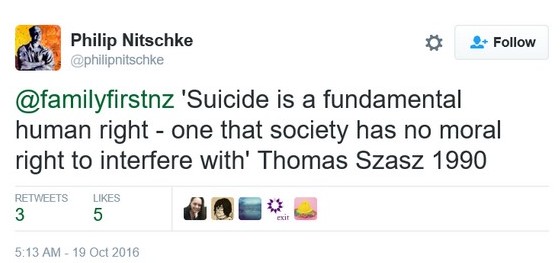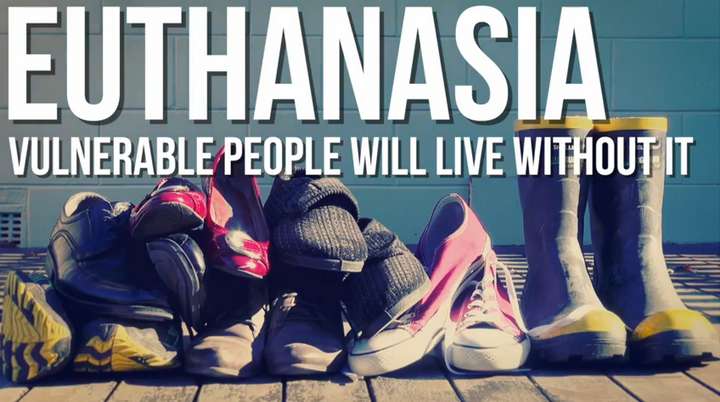Bob McCoskrie: Assisted suicide is still a form of suicide
 Newshub Online 13 Sep 2017
Newshub Online 13 Sep 2017
http://www.newshub.co.nz/home/health/2017/09/bob-mccoskrie-assisted-suicide-is-still-a-form-of-suicide.html
In a recent exchange with Family First. Nitschke tweeted; ‘Suicide is a fundamental human right – one that society has no moral right to interfere with’.
I find that attitude highly disturbing.
In 2014, euthanasia advocate Dr Philip Nitschke came under fire from two Australian suicide prevention organisations, Beyond Blue and the Black Dog Institute, after his involvement in the suicide of a physically healthy 45-year-old Australian man. In 2009, a Wellington woman ended her life with Nembutal, after receiving advice on how to obtain it from Dr Nitschke. She was a life-member of EXIT and was suffering from depression, but was physically fit and not suffering a terminal illness.
Many people believe that the promotion of assisted suicide is a message that will be heard not just by those with a terminal illness but also by anyone tempted to think he or she can no longer cope with their suffering – whatever the nature of that suffering.
And this appears to be the theme of the Facebook post by National MP Simon O’Connor – even if it was clumsily expressed.
Yet another MP Chester Borrows was even more blunt recently. “We have a horrific record on suicide and I think it sends a message that sometimes it is okay to top yourself. And I disagree with that.”
An analysis of the 21,000-plus submissions to the Select Committee considering euthanasia over the past 12 months found that almost a quarter of submissions opposing euthanasia were concerned about mixed messages being sent about suicide to the young and disabled.
You don’t discourage suicide by assisting suicide.
There is a ‘social contagion’ aspect to suicide – assisted or non-assisted – and we need more discussion about suicide prevention, not euthanasia.
Laws permitting assisted suicide send a societal message that, under especially difficult circumstances, some lives are judged to be not worth living — and that suicide is a reasonable or appropriate way out of dealing with suffering.

The Scottish Parliament considered this issue when considering the introduction of an assisted suicide bill in 2015 and said :
“The Committee is concerned that this has the potential not only to undermine the general suicide prevention message by softening cultural perceptions of suicide at the perimeters, but also to communicate an offensive message to certain members of our community (many of whom may be particularly vulnerable) that society would regard it as ‘reasonable’, rather than tragic, if they wished to end their lives.”
Protracted discussion and the promotion of assisted suicide / euthanasia and related cases will – even unintentionally – undermine the suicide prevention message and goals in the following ways:
- legalised assisted suicide can imply that the promotion of mental health and wellbeing for people in pain is futile or counterproductive, and that suicide is their best outcome
- it would normalise positive portrayals of suicide in the public domain. People contemplating suicide may justify doing it based on positive stories and arguments they have heard about assisted suicide
- it would ignore the possible harmful effects on families / whanau
The World Health Organization notes the scholarly research on the imitative nature of suicide:
“Systematic reviews of these (50) studies have consistently drawn the same conclusion: media reporting of suicide can lead to imitative suicidal behaviours.… Particular subgroups in the population (e.g., young people, people suffering from depression) may be especially vulnerable to engaging in imitative suicidal behaviours.”
It can feed into people’s fears about dying, fears which are well dealt with through the sort of holistic care provided by palliative care.
David Seymour’s bill proposes assisted suicide for someone with a “grievous and irremediable medical condition”.
If you have ever struggled with mental illness, that definition absolutely fits – at the time.
A New Zealand Medical Journal report by New Zealand suicide researchers Annette Beautrais and David Fergusson says reporting on suicide in any way puts vulnerable people at risk.
It’s time to focus on providing the very best palliative care and support for vulnerable people – whether they are at the end of their life, or momentarily wishing they were at the end of their life.
Robert Salamanca wanted to commit suicide after being diagnosed with Lou Gehrig’s disease. This was when Jack Kevorkian was – to much media acclaim – helping people with disabilities and terminal conditions kill themselves.
Eventually, he admitted, “I came out of the fog,” so happy to be alive. Bob spent his final years watching his children grow, investing successfully online to help his family financially, and collecting art. Before he died, Bob wrote a column for the San Francisco Chronicle titled “I Don’t Want a Choice to Die”:
“[R]eporting in the media too often makes us feel like token presences, burdens who are better off dead . . . Many pro-euthanasia groups “showcase” people with ALS. They portray us as feeble, unintelligible and dying by slow suffocation. This is absolutely false, and I protest their efforts vehemently. By receiving proper medical care, a terminally ill person can pass away peacefully, pain-free and with dignity. We are not people just waiting for someone to help us end our misery, but to the contrary, we are people reaching out to love . . . to be loved . . . wanting to feel life at its best. Too many people have accepted the presumption that an extermination of some human lives can be just… Where has our sense of community gone? True, terminal illness is frightening, but the majority of us overpower the symptoms and are great contributors to life.”
Suicide. Assisted suicide. We can live without them.






